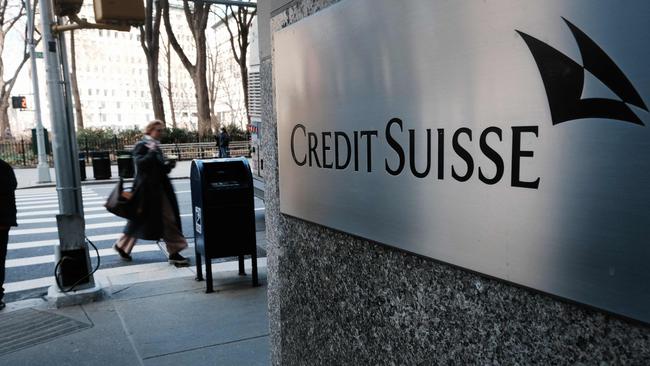Credit Suisse shares plunge 24 per cent as bank storm spreads to Europe
Swiss regulators will lend $80bn to shore up liquidity in Credit Suisse Group AG, offering a lifeline to the lender as its share price falls 24 per cent.

Credit Suisse, the Swiss bank whose shares tumbled overnight as fears about the health of global banks jumped the Atlantic Ocean, said it would exercise its option to raise as much as 50 billion Swiss francs, equivalent to $80bn, from the Swiss National Bank in a bid to stanch liquidity concerns. The bank, based in Zurich, called the decision a “decisive action to pre-emptively strengthen its liquidity.” Credit Suisse added that the move “would support Credit Suisse’s core businesses and clients as Credit Suisse takes the necessary steps to create a simpler and more focused bank built around client needs.” Investors will be closely watching the reaction when Europe re-opens for trading, following another day in markets dominated by concerns that global banking problems may be on the verge of bringing the economic expansion to an end.
Investor confidence in Credit Suisse crumbled Wednesday night, unleashing worries that a banking crisis centered among U.S. regional banks had spread across the Atlantic and was poised to unleash substantial damage to markets and the economy.
Before the regulator announcement, shares in the Swiss bank had slid 24 per cent to a new low. Prices on its bonds fell to distressed levels, indicating investors were pricing in the possibility the bank could default. Credit Suisse’s American depositary receipts, shares that trade in the U.S., jumped in the minutes after the announcement, but remained down 14 per cent for the day.
The Swiss National Bank and Finma, the top financial regulator in Switzerland, said Credit Suisse “meets the higher capital and liquidity requirements applicable to systemically important banks.” The regulators didn’t provide details of what type of liquidity they would offer, but said they are in very close contact with the bank.
The selloff in Credit Suisse had quickly spread to European banks and sparked a furious, and destabilizing rush toward the safety of government bonds. Traders reported difficulties buying and selling government bonds in the worst episode of market dysfunction since the panicky days when Covid-19 hit the world economy exactly three years ago.
Shares in France’s two major international banks, Société Générale SA and BNP Paribas SA, fell more than 10 per cent on fears that financial linkages to Credit Suisse could spread. Shares in Germany’s Deutsche Bank AG slid 9 per cent.
The drop in Credit Suisse bonds and shares indicates that “investors judge that this bank needs to be rescued,” said Joost Beaumont, head of bank research at Dutch lender ABN Amro.
“If regulators do not handle the Credit Suisse situation well, this will send shock waves through the whole sector,” he said. “To make matters worse, both sides of the Atlantic have banking issues.” The intensification of problems at Credit Suisse comes days after two major bank failures in the U.S., raising worries that institutions at the heart of business and commerce are struggling to cope with sharp increases in interest rates over the past year.
Prices on Credit Suisse bail-in bonds, which get wiped out in case the bank runs into serious trouble, fell sharply. Bid prices on the 2027 bonds on Tradeweb slid to 31 cents on the dollar from 72 cents the day before. They traded close to 90 cents at the start of the month.
Credit Suisse has been the problem child of European banking for several years. Repeated scandals and financial losses have hammered the 166-year-old bank, which combines a wealth-management business catering to the world’s elite rich with a Wall Street investment bank.
The lender has cycled through executives and has made repeated stabs at stabilizing its reputation among investors. A $US4 billion share sale in the autumn, which brought in deep-pocketed investors from the Middle East, gave the bank more time to sort out its situation. But it has nonetheless faced an exodus of client withdrawals.
The plunge in the shares came after the chairman of Credit Suisse’s largest shareholder, Saudi National Bank, said in a Bloomberg TV interview that the lender wasn’t considering topping up its investment citing regulatory rules. Saudi National Bank owns 9.9% of Credit Suisse.
The comments touched a nerve with investors. Credit Suisse shareholders have been concerned for months about the bank’s ability to make money and feared that it might have to tap shareholders again for funds. That potentially becomes more difficult if the bank’s biggest shareholder says it won’t take part in further fundraising.
Credit Suisse Chairman Axel Lehmann said Wednesday at a conference in Saudi Arabia that the bank’s capital and balance sheet were strong, and that “we are all hands on deck” to tackle problems. He said the prospect of government assistance is “not a topic whatsoever.” But the bank’s difficulties have accumulated in a drumbeat fashion, with little respite for wary Credit Suisse investors. On Tuesday, the bank said it found material weaknesses in its financial reporting. While the errors didn’t change the company’s financial results, the failure reinforced worries about the bank’s ability to stay out of trouble.
Credit Suisse is Switzerland’s second-largest bank after UBS Group AG and is a major player in international financial markets with operations across Europe and Asia and a substantial U.S. business. It had assets of around $580 billion at the end of 2022, more than twice the size of Silicon Valley Bank, which failed last week.
The bank is classified as a “systemically important financial institution” under international banking rules created after the collapse of Lehman Brothers. Such designations require the bank to hold higher amounts of capital and to maintain plans for an orderly unwinding of its operations in case it gets into trouble.
Like Silicon Valley Bank, Credit Suisse has suffered large deposit outflows in recent quarters. Some local units briefly breached regulatory liquidity coverage ratios last fall. That means they weren’t holding enough easy-to-sell assets, such as bonds, to safely cover customer withdrawals.

Unlike Silicon Valley Bank, Credit Suisse doesn’t have piles of “held-to-maturity” assets. But it has a strained business model that by the bank’s own estimation will be loss-making this year as it restructures its workforce and tries to sell assets in a noncore unit.
Credit Suisse’s funding costs, or what it has to pay to depositors or debt providers, have skyrocketed, further squeezing the ability of the bank to generate profit.
Problems at Credit Suisse loom large over Switzerland’s finance-heavy economy. Banking-sector assets there were around 500% of gross domestic product in 2020, around five times as big as those in the U.S.
Credit Suisse’s U.S. arm is overseen by the Federal Reserve and other financial regulators. Under Swiss bank-resolution processes, financial regulator Finma would take over any failing bank’s global operations and can convert debt to equity and write off securities counting toward regulatory capital. The regulator has said its approach avoids complex and messy jurisdictional disputes between authorities.
The U.S. Treasury is monitoring developments at Credit Suisse and has been in contact with foreign counterparts, according to a spokesman.
European Central Bank officials contacted lenders it supervises Wednesday to ask about financial exposures to Credit Suisse, according to people familiar with the matter.
An ECB spokeswoman declined to comment.
Credit Suisse has suffered from customers pulling deposits and other assets it manages on behalf of rich clients. The bank said Tuesday the outflows had slowed but hadn’t reversed.
David Callahan, head of cash solutions at Lombard Odier, a smaller rival to Credit Suisse in Switzerland, said his own customers were jittery.
“Credit Suisse is driving the biggest part of the concerns we’re hearing about. The SVB closure and other bank closures that have followed have people questioning whether placing large deposits is right for cash management.” He said money-market funds he manages don’t hold any Credit Suisse assets.
The nerves in markets prompted bank executives to petition ECB officials to hold off on a planned half-percentage-point rate increase Thursday.
Lorenzo Bini Smaghi, former executive board member of the ECB and chairman of Société Générale, said in an interview with German newspaper Boersen-Zeitung that financial contagion has already led to some tightening of monetary conditions. If overdone, the ECB could risk a repeat of 2011, when it continued to lift interest rates despite contagion from Greece’s debt troubles.
“When one part of the financial system goes into crisis, it’s normal for there to be some contagion to the whole system, as investors tend to wonder, ‘Who’s next?’
Dow Jones







To join the conversation, please log in. Don't have an account? Register
Join the conversation, you are commenting as Logout